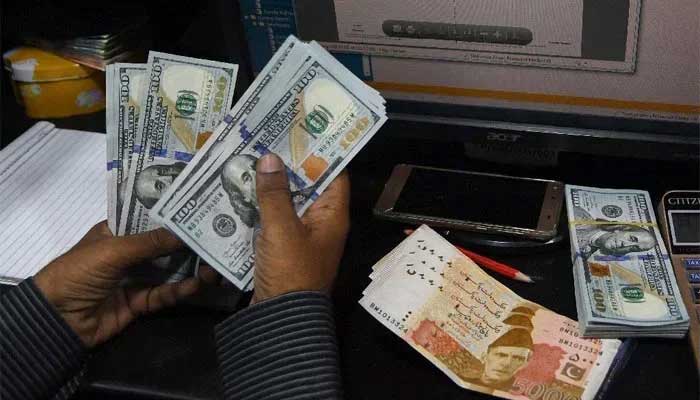PKR to dollar: Rupee continues free fall for eighth straight session
The local unit fell by Rs2.1 to Rs231.92 in the interbank market, down in value from yesterday's close of Rs229.82
KARACHI: Hammered by cataclysmic floods and political uncertainty in the country, the Pakistani rupee continued its downward spiral for the eighth consecutive session against the US dollar Tuesday.
The local unit fell by Rs2.1 to Rs231.92 in the interbank market, down in value from yesterday's close of Rs229.82. The rupee also lost Rs9.21 or 4.2% against the greenback cumulatively last week.
Exchange Companies Association of Pakistan (ECAP) General Secretary Zafar Paracha told The News that it was imperative for all stakeholders to sit at the talking table and resolve Pakistan's issues.
The ECAP official said it was expected that once the International Monetary Fund's (IMF) loan comes in, the rupee would gain ground against the dollar — and it happened as the local united appreciated Rs2 after the SBP received the amount.
But, he noted, the downfall persisted since then — with minor negligible gains — as, despite money from the global lender, the country did not get monies from multilateral and bilateral organisations.
Paracha added that Asian Development Bank (ADB), World Bank (WB), and friendly countries — Saudi Arabia, UAE, and Qatar — are still reluctant to give loans and invest in Pakistan.
"The main reason behind this: political instability," Paracha said, noting that on the day that the IMF's Executive Board was about to approve handing over the amount to Pakistan, PTI's governments in Punjab and KP announced that they will not fulfil the IMF requirements.
"A negative impact was made due to this. PTI rules a huge chunk of the country and it has its importance [...] but right now, we need political stability and the government has no clear vision," he lamented.
Paracha said that despite being in government, all the parties are behaving as if they were in opposition. "No one is performing to provide relief to the people and no one is willing to restore the economy. Everyone is playing the blame game."
But apart from criticising the government functionaries, Paracha praised the State Bank of Pakistan (SBP), saying that the institution has played an effective role through various policies over time.
Moving on to the impact of floods, Paracha said that government officials have estimated it to be around $30 billion, but he feared that it could be around $50 billion.
"The losses are massive, but we do not have enough donations to overcome the gap," he said.
Floods from record monsoon rains and glacial melt in the mountainous north have affected 33 million people and killed almost 1,400, washing away homes, roads, railways, livestock and crops.
-
US lawmakers introduces new bill to define crypto market rules
-
Apple tops global smartphone market in 2025, says report
-
AI boom set to lift TSMC’s Q4 profit by 27%
-
An eye on 'global economic instability' as shares slumps, tensions intensify
-
Tesla dethroned: BYD shocks EV market as top seller in 2025
-
China sets up $8.9B fund to boost 2026 consumer goods trade-in
-
Meta to acquire Chinese AI startup Manus to expand advanced AI capabilities
-
China to roll out action plan for digital yuan expansion












